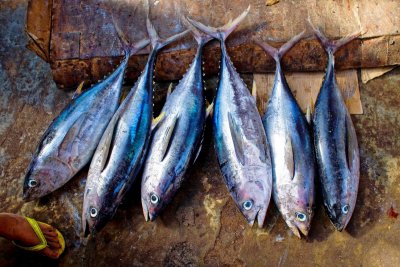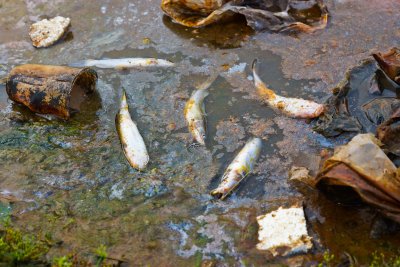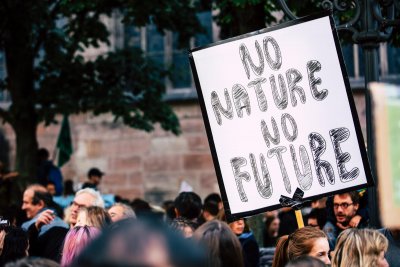Our seas have historically been an abundant source of food, income and employment, but at the moment are failing to meet their full potential. Two thirds of UK stocks have been overfished and if left to recover could generate 45% higher landings and an additional 4,900 jobs.
A range of measures must be implemented urgently to ensure that we conserve and restore precious fish stocks and marine ecosystems. This includes marine protected areas, scientific assessment of stocks and conservation status, an accelerated shift to sustainable fishing methods, and a reliable market for those fishers who are managing stocks and ecosystems sustainably.
Our vision is that all fish caught and sold in the UK should be verifiably sustainable.
Since 2009, Sustain has been playing our part by working with the main marine conservation groups and foodservice companies to shift very large amounts of the UK's catering companies to buying only verifiably sustainable fish. Caterers that serve well over 800 million meals a year have now signed up to our Sustainable Fish Cities pledge.
The UK benefits from being able to sell some of its fish, here and abroad, as “sustainably sourced” an increasingly important assurance. But not all UK fish is considered sustainable, often for a remediable reason such as lack of data or management plan, so some UK fleets are missing out on good markets worth millions of pounds each year.
All fish bought or sold in the UK should be verifiably sustainable and marketed as such; either by meeting the Marine Stewardship Council, Aquaculture Stewardship Council, Global Aquaculture Alliance or GlobalGAP certification standards or being considered ‘Fish to Eat’ by the Marine Conservation Society.
How can this vision be achieved?
We are calling for forthcoming national legislation and government policy to do the following:
1. Improve fish stocks and marine ecosystems
The UK’s fisheries are not being managed at their economic optimum. Government figures show that two thirds of our main commercial fish stocks are depleted, overfished, at risk of being depleted, or their status is unknown. Only one third are operating at maximum productivity (known as Maximum Sustainable Yield; MSY) at the moment. The good news is that many fish stocks recover quickly if they are managed well. An estimate by the New Economics Foundation found that if fishing was halted completely most UK fish populations could be restored in just 5 years. Whilst we’re not advocating something as radical as this, it demonstrates that short term recovery is possible. The following must be urgently prioritised:
- An ecosystem based approach: managing fish as an integral part of healthy ocean ecosystems, and taking account of the cumulative impact of human activities on the environment.
- All fish stocks restored and maintained above biomass levels capable of producing the maximum sustainable yield by 2020.
- Fisheries management decisions based on best available science.
- Fully transparent and accountable fisheries where catches, both target and non-target, are fully documented, infringements are properly enforced and fisheries are effectively controlled.
Sustain supports the marine conservation measures championed by Greener UK: www.greeneruk.org/resources/sustainable_fisheries_management.pdf
2. Create a new and better fishing quota allocation system
The UK has the opportunity to come up with new ways to allocate fishing quota. This should reward smaller-scale and sustainable fishing, with very specific rewards for beneficial activities such as participation in fisheryimprovement projects, implementation of vessel monitoring, observing the discard ban, sustainability certification and being part of Seafish’s Responsible Fishing Scheme, including:
- Identify a set of criteria to define environmentally and socially responsible fishing, to include high selectivity, effective vessel monitoring, fully recorded catches, recognising small-scale fleets and established fishing communities.
- Switch a meaningful portion of UK quota over to a new system that would reward and incentivise such fishing in a phased-in approach, to avoid shocks, for example allocating an increasing percentage year on year according to this new criteria, as well as a plan to review criteria and respond to scientific data.
- Publish in detail the process and justification for allocating quota, and the plan for switching over, to ensure transparency and accountability
- Encourage community quota-sharing schemes in which boats in an area could ‘pool’ quota, then allocate amongst community members according to individual preferences and opportunities, giving communities greater control.
3. Tackle data deficiency
Data deficiency is one of the main reasons that much of the fish caught in UK waters can’t be marketed as sustainable. For fishing to be sustainable there must be a sufficient understanding of the population of the targeted species, the impact of fishing, and/or the status of seafloor ecosystems. Without this data, boats can be considered ineligible for MSC certification or receive a lower rating on the Marine Conservation Society’s Good Fish Guide.
- The UK should set a target to eliminate data deficiency within three years, to give fisheries the best chance of effective management and marketing produce as sustainable
- Improve data collection with electronic monitoring systems (including CCTV) on all boats and fully recorded catches.
4. Target funding to help the UK fishing industry
The European Maritime and Fisheries Fund, to which the UK currently contributes, must be replaced by a UK fund that can continue to support the transition of all fishing activity to a sustainable basis, including gear modification, data collection and the costs of sustainability certification.
5. Use public procurement to support and encourage sustainable fishing
Government should act as a leader and a responsible consumer through its public-sector buying; linking sustainable fishing policy with public health and boosting incomes for the UK fishing industry.
At the moment, though, sustainable fish buying standards are not effectively enforced, or it is not possible to find out if they are being met. In a recent study the Sustainable Fish Cities campaign found that only one of the contract caterers serving large Ministry of Defence contracts could confirm that they met the Government Buying Standards, whilst another study found these same caterers serving red-rated fish. A Department of Health report, published in 2017 and confirmed by Sustain research in 2018, showed that only half of NHS hospitals were meeting the basic food standards.
Sustain’s analysis suggests that at the moment about 70% of the fish served by contract caterers in the UK is imported, even though in some cases there are suitable sources closer to home including coley, whiting, herring, mackerel and farmed trout. Clear, universal and predictable buying criteria for the public sector would help to introduce the public to less-familiar species and incentivise supply chain companies to produce new products.
Contact: Ruth Westcott, Sustainable Fish Coordinator, Sustain: ruth@sustainweb.org
Tuna fish. Credit: Pixabay
Climate Change and Nature: Sustain has taken a keen interest in the rapidly accumulating evidence about the effect of food and farming on climate change and nature, as scientific evidence emerges that our food system is a very significant contributor to greenhouse gas emissions and biodiversity loss.



